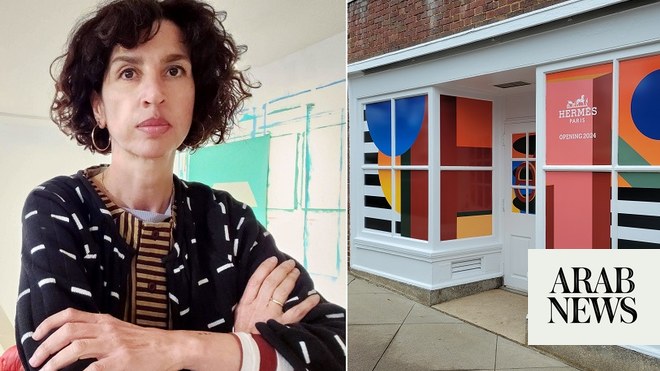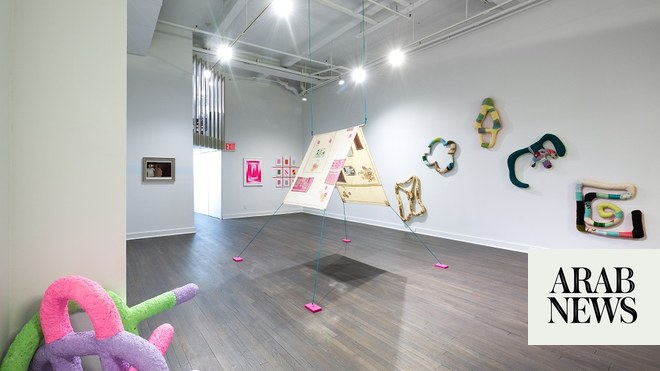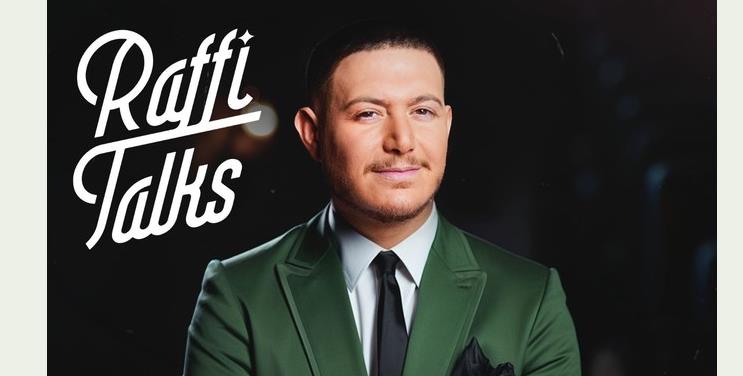
‘But You Don’t Look Arab: And Other Tales of Unbelonging’ has been released in the US and UK
Hala Gorani: ‘The title came before the book, because I’ve heard it my whole life’
LONDON: The world is a small place, as they say. The acclaimed Syrian-American journalist and former CNN broadcaster, Hala Gorani, was in Haiti, reporting on an earthquake that obliterated the capital city of Port-au-Prince in 2010. Looters had emerged, and the situation grew dangerous as gunshots were heard. With her film crew, Gorani found herself in a food shop, where its owner spoke with a familiar accent. In the unlikeliest of situations, amid fear and destruction, a brief yet friendly connection was developed: It turned out that the owner was from Syria too.
“I would have never guessed you were Syrian. You don’t even look Arab,” he told the blonde and blue-eyed Gorani. She never saw him again, but that defining phrase became the title of her highly anticipated memoir, “But You Don’t Look Arab: And Other Tales of Unbelonging,” which has been newly released in the US and the UK. “The title came before the book, because I’ve heard it my whole life,” Gorani told Arab News from her home in London. “I don’t look anything like a typical Arab in the stereotype that people have in their minds.”
In her candid book, Gorani talks about the women in her family history, childhood memories and covering major political events of the past 25 years. She details the incredible story of her Circassian great-great grandmother, Hurnigar Gorani, who was only a child when she was kidnapped and taken to an Ottoman sultan’s palace. She never saw her family again.
“It was both interesting and in some cases sad that you had these women who were ultimately not necessarily in charge of their own destinies,” Gorani said. “And part of the reason I have lived such a different life to theirs and what was expected of me was that I always wanted to say: I’m deciding for myself and I do what I want — whether it’s professionally or in my family life. Maybe it’s kind of like a five-generation-later rebellion.”
Gorani, who speaks three languages, hails from a cosmopolitan background. She was born in Seattle to parents from Aleppo, and was later raised in Paris. Like many Arabs who grew up abroad, she felt out of place, or “stateless.” In France, she was embarrassed by her name and, during holiday trips to Syria, she was teasingly called “Hala the American” by her family. As she got older and started sending out her resume for job opportunities, she noticed that if she didn’t write down that she spoke Arabic, employers would call her.
But there’s a silver lining, eventually. “I think that it was both hurtful but also formative at that age,” she said. “At the time I wished I looked like and dressed like everybody else, but part of, I think, maturing and seeing the bigger picture is to accept that that was actually a blessing rather than a curse.”
From a young age, Gorani liked telling and documenting stories. She particularly remembers being ten years old, when the attempted assassination of former US president Ronald Reagan took place. It sparked something in her. “I’ve been watching these special news flashes all day on the main US networks, and when I announced the news to my family I remember feeling such a thrill,” Gorani said.
At 21, Gorani, who has a degree in economics, began her career in print journalism with Agence France Presse. In a fast-paced environment, she wrote her first wire copy with her initials printed: “That was the biggest thrill and I knew then that I want to do this for a living. It was such an adrenaline rush.”
At 25, in London, she joined Bloomberg as a finance news journalist. Then she made her way to CNN during its “golden years.”
Gorani said: “It was the most prestigious platform at the time.”
For more than 20 years, since 1998, Gorani made her name at CNN by anchoring the daily news, interviewing high-profile personalities (from the Dalai Lama to Naomi Campbell), and reporting about difficult situations on the ground. Always on the move, she has seen it all, from the Sept. 11 attacks to the rousing Arab Spring, the nail-biting rise of Trump and the COVID-19 pandemic. In Cairo’s Tahrir Square, she endured attacks and was, one time, live on-air for 11 hours, reporting on the Brexit referendum with co-anchor Richard Quest. Talking about Syria, understandibly, got to her most, where at one point she couldn’t “watch a single frame of destruction in Syria, even if my job required me to.”
However, she says that the most rewarding part of her job was hosting her eight-year program “Inside the Middle East,” during which Gorani visited every Arab country, showing a more humanizing side of a region marred with conflict. “I would literally have Arabs come up to me with this emotion, this voice cracking, saying, ‘Thank you for portraying us as just people with a different set of concerns and passions, rather than just politics all the time.’” She covered, for instance, Palestinian embroidery, Aleppo’s historic sites, and frankincense in Oman. Looking back at those days is bittersweet for Gorani. “It affects me today because I filmed the Middle East that doesn’t exist anymore,” she said.
In the early days, being a top anchor, who was Arab-American, at CNN was a big accomplishment, but a responsibility too. “As minorities, we sometimes feel like we represent — even though we shouldn’t since no nobody voted for us — a part of the world, and through us, maybe we can serve as inspiration.”
In 2022, Gorani made the surprising announcement that she would leave the network. “If you had told teenage-me that this Arab-American daughter of Syrian parents would one day have her own show on this network, I would not have believed you,” she said on television in a farewell speech. “But I did, and the gratitude I feel today is immense.”
On her Instagram account, many followers wrote to her, saying, “I have always looked up to you as a role model.” She has clearly left a mark on viewers everywhere, paving the way for several Middle Eastern journalists today. So, why the change of heart?
“I think the most important thing in life is to have a sense of purpose and duty,” she says. “I’d anchored a show for a long, long time and there was less travel involved. I think it’s a dream job, but I needed to go back to my roots. I needed to feel the thrill of journalism again. And for me, not for everybody, it meant going back to the field and really doing the things that I did 20 years ago.”
During our conversation, Gorani is down-to-earth and dressed casually, sitting near her cavalier dog, Louis. Now a freelancer who appears on NBC News, Gorani lives in the UK with her husband, fellow journalist Christian Streib, whom she met at CNN and married at 45. “I’m delighted with that choice, and I think it’s exactly the marriage I wanted, and so it happened later,” she said.
In charge of her own schedule, an option which she didn’t have before, it seems like Gorani is at peace in her life, embracing all the identities and places that have shaped her. You can’t just be one thing or belong to one place, she said. As she writes in her book, “Perhaps home, this entire time, was always the journey itself.”











